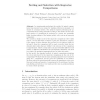Free Online Productivity Tools
i2Speak
i2Symbol
i2OCR
iTex2Img
iWeb2Print
iWeb2Shot
i2Type
iPdf2Split
iPdf2Merge
i2Bopomofo
i2Arabic
i2Style
i2Image
i2PDF
iLatex2Rtf
Sci2ools
ICALP
2009
Springer
2009
Springer
Sorting and Selection with Imprecise Comparisons
Abstract. In experimental psychology, the method of paired comparisons was proposed as a means for ranking preferences amongst n elements of a human subject. The method requires performing all n 2 comparisons then sorting elements according to the number of wins. The large number of comparisons is performed to counter the potentially faulty decision-making of the human subject, who acts as an imprecise comparator. We consider a simple model of the imprecise comparisons: there exists some > 0 such that when a subject is given two elements to compare, if the values of those elements (as perceived by the subject) differ by at least , then the comparison will be made correctly; when the two elements have values that are within , the outcome of the comparison is unpredictable. This corresponds to the just noticeable difference unit (JND) or difference threshold in the psychophysics literature, but does not require the statistical assumptions used to define this value. In this model, th...
Human Subject | ICALP 2009 | Imprecise Comparator | Imprecise Comparisons | Theoretical Computer Science |
Related Content
| Added | 03 Dec 2009 |
| Updated | 03 Dec 2009 |
| Type | Conference |
| Year | 2009 |
| Where | ICALP |
| Authors | Avinatan Hassidim, Jelani Nelson, Miklós Ajtai, Vitaly Feldman |
Comments (0)

